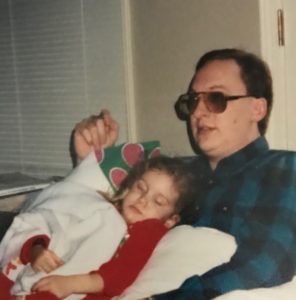
We called Molly our “Happy Baby Duck.” I’m not sure why we didn’t just call her “Happy Baby” and had to add the “Duck” part. She was our second, Anna was our first. Anna relied on us constantly to be her entertainment. Because we didn’t know any different, we thought all babies were like that. When we discovered that Molly could entertain herself, we rejoiced!
All of our children mispronounced words as they were learning them; so Molly’s mispronunciations are part of our family lore. “Chup-chup” was Catsup, “yun-yun” was onion, “crash can” was trash can, “churky” was turkey—or was it a mix of chicken and turkey?
We would often deep fry chicken fingers for the kids. Once we fried fish instead. When Molly tasted it, she proclaimed, “good chicken!” We just smiled and nodded.
We took Molly to the fair. She saw a watermelon for the first time. So she pointed at it and cried, “Apple!” That was a mighty big apple.
I wish we all would keep our innocence and not be ashamed to make mistakes. When do we decide that other people’s opinions of us are more important than learning new things and being a beginner?
Molly lost some of that innocence in the second grade. It was the first time she didn’t score 100 percent on a test. She was crushed! We tried to explain to her that nobody gets 100 percent every time. She wouldn’t hear of it.
It wasn’t easy for her to grow up as a middle child. Anna and Andrew bonded, I think because the difference in their ages made them less competitive with one another. Molly was often left out. Anna would regard Molly with open disdain. Looking back, I regret not being more insistent with Anna that she treat Molly with respect.
Molly would play with me by treating me like her own jungle gym. She would grab me around my ankle and sit on my foot. Then Anna would do the same with my other ankle. I would try to walk around the kitchen this way, sliding them across the floor.
Molly also wanted to do “hip-ups.” She would sit on my knees. I would pretend to have hiccups. With every hiccup I would jerk my legs upward and throw her into the air, and she would land back on my knees with a jolt. Then she’d rebalance herself and wait for the next hiccup.
Once Jamie left me with the children for several days while she went on a trip. It was the first time she left the children with me for this long. Jamie was nervous about leaving the kids with me, but I assured her that I had it handled.
The morning after she left, Molly awoke with pain in her hip. She could barely walk. But she could, technically, walk. So I sent her off to school. Within two hours, the school nurse called. She said Molly now couldn’t walk at all, and recommended I pick her up and take her to the emergency room.
At the hospital, we found that she had an infection in her hip. They needed to drain fluid from the hip, and they had a big honking syringe for the job. I was deathly afraid of needles, and yet I had to reassure Molly through the procedure. Let’s just say it was a bonding moment.
After that, I’m surprised Jamie ever left town again without the children. And Molly would tease me about being a lackadaisical parent ever after.
 Molly played a number of sports. She went out for track in high school. Her event was 100-meter hurdles. She eventually had to stop due to a groin pull, but she did have some shining moments. She made it onto the sports page once when a newspaper photographer snapped her picture going over the hurdles. I think the photographer was impressed by the determined look on her face.
Molly played a number of sports. She went out for track in high school. Her event was 100-meter hurdles. She eventually had to stop due to a groin pull, but she did have some shining moments. She made it onto the sports page once when a newspaper photographer snapped her picture going over the hurdles. I think the photographer was impressed by the determined look on her face.
Regional finals arrived, and she made it into the final race. She had never won at a meet before. She had never gone over the hurdles cleanly. But with the pressure on, she cleared every hurdle and won the region championship!
It’s that determination and grace under pressure that helps Molly get through anxious times in her lives. And she’s had a few. Space doesn’t allow me to go into detail. As a small child, she had a line beyond which she was simply inconsolable. Even as an adult, she is conscious of her limits and careful not to exceed them when she has a choice. This is her courage.
At the time, I was uncomfortable with emotion. (I’ve grown a lot since then.) So when Molly got emotional, I tried to fix it. I would try to make her feel better rather than acknowledge the sadness and just be with it. I finally learned how to best be with her emotions in her later teen years.
My relationship with Molly bloomed in high school, particularly after Anna went to college. What I didn’t stop to realize is that Molly and Andrew would leave so quickly after Anna left. So I began to savor my time with Molly more.
I realized I didn’t touch her much, so I started to self-consciously put my arm around her more. She was very happy, and responded. Often when she’d see me from a distance, she would run full-speed at me and give me a full-impact hug. This made me very happy too.
She called me “Daddy” into adulthood, probably still does. Or she’d call me “Daay” and I’d call her “Maay.”
Molly didn’t date in high school. She started “hanging out” with boys in college, but she didn’t have any serious relationship with a guy until she met her Matt. Matt was the president of the Baptist Campus Ministry. (When I went to my Baptist college, it was called the Baptist Student Union.)
Molly didn’t so much convert from Catholicism as she found where she belonged. Like many who have had religious experiences in college, she became passionate for Jesus. I was happy she found her community.
When Matt and Molly graduated, Matt decided to go on a mission trip to Liberia for several months. They were serious about each other, but to my knowledge they weren’t officially engaged. At the last minute, he was asked to wait a few weeks because a new disease called Ebola was starting to be epidemic in Liberia. Needless to say, he never got on a plane to Africa.
Matt proposed to Molly within a few months are were married before he would have returned from Liberia.
Molly told me before the wedding that she was couldn’t wait to see me cry. I did manage to tear up during my rehearsal dinner speech. But it was too dark for her to see me cry, so she felt cheated. Sorry Molly, you missed your chance!
Matt is a good man, Southern polite, soft-natured and strong in his faith. He’s able to get hired anywhere he goes. He supports Molly in whatever she wishes to do and dream.
Molly calls me for advice. Now that I’ve been a coach for a while, I attempt to coach her through these decisions instead of just giving her my opinion. Once, after several attempts to get advice out of me, she finally said, “You aren’t going to tell me what to do, are you?” So I lightened up on the coach stuff and became an opinionated Dad again—at least a little.
Molly is responsible. Jamie and I have to treat her well because she’s the child most likely to be taking care of us in our old age.
Molly has a good heart, sensitive and yet strong. She cares.
Molly is social, the most social of our children. In that sense she takes after her mom. She comes alive around other people and shows her excitement. Her degree was in technical communications, but she found that to be too isolating. So now she works in an assisted living center, cooking and serving breakfast to retirees. She loves it.
Until I went through my own personal growth, it was hugely awkward for me to tell anybody I love them—not friends, not family. So it wasn’t until they were teens that I consistently told my kids I love them. I think they knew, but that didn’t excuse my omission. I’m happy to say that Molly and I—all of us—are now very comfortable telling each other that we love them. I’m so glad I got out of my comfort zone and started saying it.
I love you Maay.
Daay
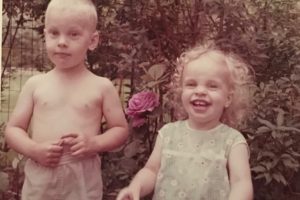
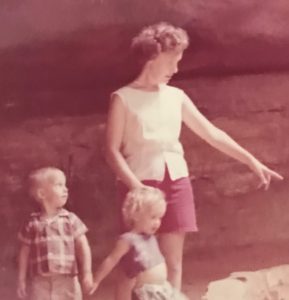
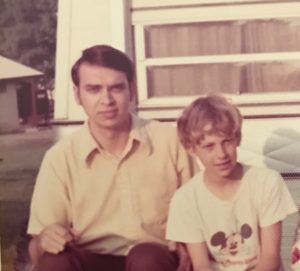
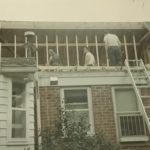
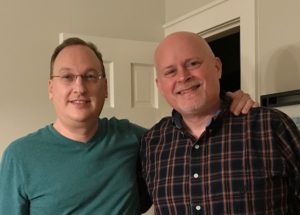
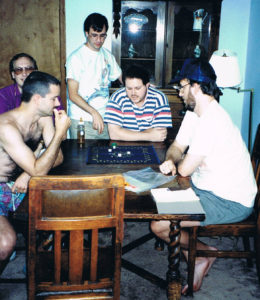
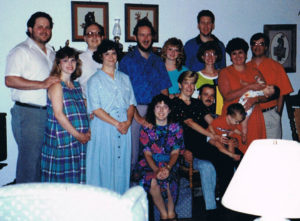 We would meet for 30 summers. Four or five families each summer.
We would meet for 30 summers. Four or five families each summer.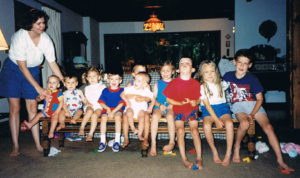 Guys, you changed my life in ways you can’t even imagine. This letter only scratches the surface of the level of friendship, connection, and belonging we experienced together. When I was young, I thought it was just me who felt this way about us. Now I know.
Guys, you changed my life in ways you can’t even imagine. This letter only scratches the surface of the level of friendship, connection, and belonging we experienced together. When I was young, I thought it was just me who felt this way about us. Now I know.